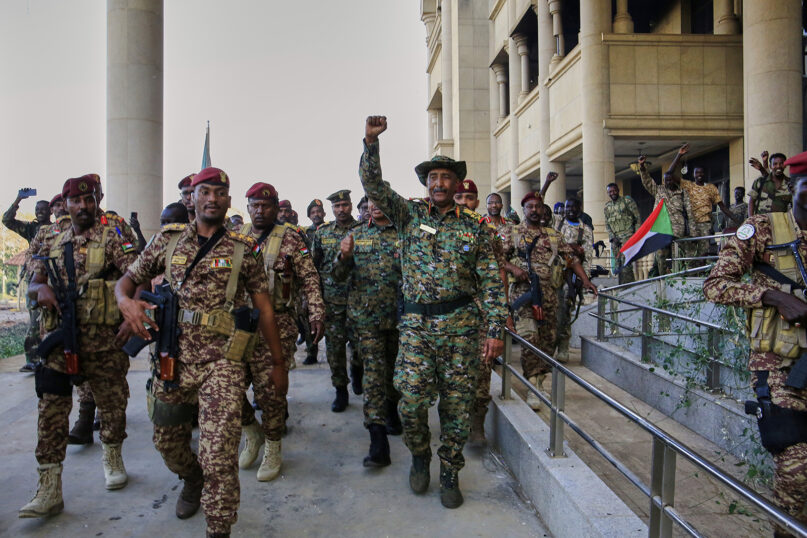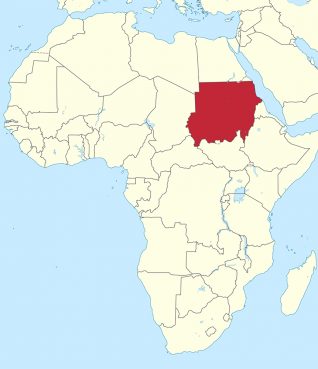KHARTOUM, Sudan (RNS) — In the Al Jazirah state of central-southeast Sudan, Peter and dozens of his neighbors hold secret prayer services whenever they can.
They’ve had to hide their Christian worship services amid the civil war in the country, especially after an attack by the Rapid Support Forces, a paramilitary organization formerly operated by the Sudanese government, on the Sudanese Church of Christ in Al Jazirah on Dec. 30, 2024. The attack left at least 14 people, including women and children, seriously injured.
“The soldiers destroyed our church and vowed to eliminate all Christians,” Peter told RNS via phone. He is being identified by a pseudonym due to fears for his safety. “They warned us against gathering for worship, so we have been doing it in secret to prevent their agents from reporting us.”
Peter said Christians face threats from both rival factions of the military government currently at war. Both have vowed to eliminate all Christians in the northeastern African country, which has a population of over 49 million. Approximately 5.4% of the population identifies as Christian, while 91% are Muslim, and a small percentage follow Indigenous religions.
Attacks on Christians’ and other faiths’ places of worship, including mosques, have escalated across the country. The U.S. Commission on International Religious Freedom reported in April 2024 that more than 150 churches have been damaged since the war began in 2023. These attacks have prompted condemnation from the international community, faith-based organizations, human rights groups and religious leaders.
The Sudanese Armed Forces, led by Gen. Abdel Fattah al-Burhan, and the RSF, commanded by Gen. Mohamed Hamdan Dagalo, who was previously al-Burhan’s deputy, are engaged in a fierce power struggle to control the country’s valuable resources, including gold and oil. The conflict has claimed an estimated 150,000 lives and displaced over 13 million Sudanese, with 4 million fleeing the country. Civilians face a dire lack of food, health care and hope for peace.

Sudan’s military chief Gen. Abdel Fattah al-Burhan, center, is greeted by troops as he arrives at the Republican Palace, recently recaptured from the Rapid Support Forces paramilitary group, in Khartoum, Sudan, March 26, 2025. (AP Photo)
On Aug. 16, 2024, the United States began peace talks in Geneva. Although representatives from the RSF participated, the SAF boycotted the talks — a decision that raised concerns about the possibility of achieving lasting peace and stability in the region.
RSF fighters began withdrawing from the capital of Khartoum on March 26, The New York Times reported, as SAF gained control of the city, marking an inflection point in the war. RSF is likely to withdraw forces in Darfur in western Sudan as well, the report said.
Soldiers have been preventing Christians from attending church, from holding weekly fellowship meetings in their homes, from openly expressing their faith and from converting from Islam to Christianity, Peter said.
Evangelical pastor Ibrahim Okot said the war has significantly impacted the Christian community in the country. The Khartoum-based pastor said soldiers have targeted Christians who had previously been protected by the constitution before the nation descended into civil war.

Sudan, red, in northeast Africa. (Map courtesy of Creative Commons)
“We lived together as brothers and sisters, but the war has taken on a religious aspect with soldiers now targeting Christians and places of worship,” Okot said. “They do not want anything to do with God or spirituality, which is harmful for any country.
“We are praying for an end to the war to save Christianity and the lives of millions of innocent people,” he added. “It’s now hard to be a Christian in this country. You can’t carry your Bible openly, pray, gather to worship or identify yourself as a Christian.”
Christian Solidarity Worldwide, a U.K.-based human rights organization, recently raised concerns about the daily threats faced by Christians in Sudan. Soldiers continue to attack areas where they live, posing a serious risk of violence and the potential elimination of their communities.
“The targeting of places of worship violates both domestic and international law, and, in the context of conflict, international humanitarian law,” said Mervyn Thomas, founder and president of CSW, earlier this year. “We call on the international community, including the UN Fact-Finding Mission on Sudan, to document these attacks thoroughly with a view towards ensuring accountability.”
Pastor Philemon Hassan of Al Ezba Baptist Church in Khartoum North — whose church was attacked by an SAF airstrike that killed 11 people on Dec. 20, 2024 — said many people are dying, suffering and lacking basic humanitarian necessities for survival. He emphasized that lasting peace between the warring factions is essential to halt the continuous attacks on Christians and their places of worship.
“Our prayer to God is for this war to end as soon as possible,” Hassan said.
Simon Umar, a church elder at a Pentecostal church in Khartoum, also said that without peace, Christians will continue to suffer from attacks and will live hiding in fear. He said the Christian communities in Khartoum and other areas have tried to gather in small congregations to worship and support one another during the war. However, these efforts have not been successful as they have faced attacks that resulted in fatalities, he said.
“We attempted to gather, but it was impossible because nowhere is safe,” he said, urging both warring parties to consider the suffering of the people in Sudan and stop the war. “Christianity can only thrive in an environment of peace and stable government that protects everyone’s rights, including the right to worship and gather.”
Thomas also urged “the warring parties to agree to an immediate ceasefire” and “the international community to increase efforts to ensure the protection of civilians in Sudan.”
Meanwhile, Peter emphasized his neighbors’ commitment to gathering secretly as they seek spiritual nourishment and pray for a swift resolution to the conflict.
“We cannot stop praying, as that is the key to resolving the ongoing conflict,” he said. “I urge both RSF and SAF soldiers to refrain from targeting Christians and places of worship. Our prayers are crucial for achieving lasting peace.”
Ameen Auwalii contributed to this report from Khartoum, Sudan.